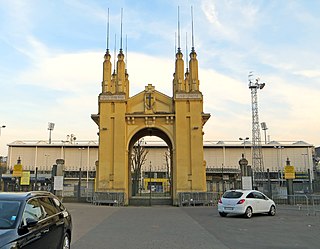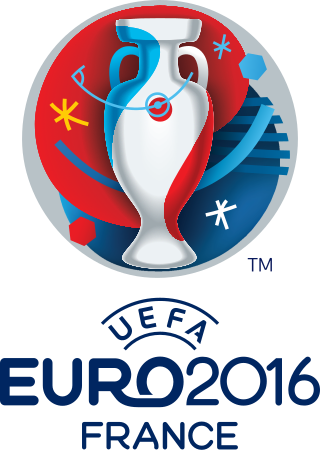
The UEFA European Football Championship, less formally the European Championship and informally the Euro, is the primary association football tournament organised by the Union of European Football Associations (UEFA). The competition is contested by UEFA members' senior men's national teams, determining the continental champion of Europe. It is the second-most watched football tournament in the world after the FIFA World Cup. The Euro 2012 final was watched by a global audience of around 300 million. The competition has been held every four years since 1960, except for 2020, when it was postponed until 2021 due to the COVID-19 pandemic in Europe, but kept the name Euro 2020. Scheduled to be in the even-numbered year between FIFA World Cup tournaments, it was originally called the European Nations' Cup before changing to its current name in 1968. Since 1996, the individual events have been branded as "UEFA Euro [year]".

The 1984 UEFA European Football Championship final tournament was held in France from 12 to 27 June 1984. It was the seventh UEFA European Championship, a competition held every four years and endorsed by UEFA.

The Stade de France is the national stadium of France, located just north of Paris in the commune of Saint-Denis. Its seating capacity of 80,698 makes it the sixth-largest stadium in Europe. The stadium is used by the French national football and rugby union teams for international competitions. It is the largest in Europe for track and field events, seating 78,338 in that configuration. During other events, the stadium's running track is mostly hidden under the football pitch.

The Stade Vélodrome, known for sponsorship reasons as the Orange Vélodrome since June 2016, is a multi-purpose stadium in Marseille, France. It is home to the Olympique de Marseille football club of Ligue 1 since it opened in 1937, and has been a venue in the 1938 and 1998 FIFA World Cups; the 1960, 1984 and 2016 editions of the UEFA European Championship; and the 2007 and 2023 Rugby World Cup. It occasionally hosts RC Toulon rugby club of the Top 14. It is the largest club football ground in France, with a capacity of 67,394 spectators. The stadium is also used regularly by the France national rugby union team.

The Stadio Olimpico is the largest sports facility in Rome, Italy, seating over 70,000 spectators. It is located within the Foro Italico sports complex, north of the city. The structure is owned by the Italian National Olympic Committee and it is used primarily for association football. The Stadio Olimpico is the home stadium of the Roma and Lazio football clubs, and also hosts the Coppa Italia final. The Italian Rugby Union team also use the stadium for their home matches. It was rebuilt for the 1990 FIFA World Cup and it hosted the tournament final.

The Stade de la Beaujoire – Louis Fonteneau, mostly known as Stade de la Beaujoire, is a stadium in Nantes, France. It is the home of French football club FC Nantes.

The Stadio San Nicola is a multi-use all-seater stadium designed by Renzo Piano in Bari, Italy. It is currently used mostly for football matches and is the home stadium of S.S.C. Bari. The stadium's design resembles a flower. To create this particular design, the stadium consists of 26 'petals' and upper tiers of the higher ring separated by 8-metre empty spaces, sufficient to guarantee satisfactory security conditions.

Stadio Ennio Tardini, commonly referred to as just Il Tardini, is a football stadium in Parma, Italy, located near the centre of Parma, between the town centre and the city walls. It is the home of Parma Calcio 1913. The stadium was built in 1923 and was named after one of Parma's former presidents, Ennio Tardini. The stadium is the nineteenth largest football stadium in Italy and the second largest in Emilia–Romagna with a capacity of 22,352 spectators. The stadium is the sixth oldest Italian football ground still in use.

Stade Geoffroy-Guichard is a multi-purpose stadium in Saint-Étienne, France. It is used primarily for football matches, and tournaments such as the UEFA Euro 1984 and 2016, the 1998 FIFA World Cup and the 2003 FIFA Confederations Cup. It is also used for rugby union, and was a venue at the 2007 Rugby World Cup. It is nicknamed "le Chaudron", or "l'enfer vert", an allusion to the colours worn by the local football team, AS Saint-Étienne, given during the team's heyday when it drew particularly large crowds. More recently, its current capacity was 35,616 before the current renovations, which began in 2011 and temporarily reduced this figure to 26,747. Since the renovations finished, the stadium holds 42,000 seated spectators.

The Stade de la Meinau, commonly known as "La Meinau", is a football stadium in Strasbourg, France. It is the home ground of RC Strasbourg and has also hosted international matches, including one game of the 1938 World Cup, two games of Euro 1984 and the final of the Cup Winners' Cup in 1988. La Meinau has also been used as a venue for concerts and a mass by John Paul II in 1988. The stadium is owned by the Strasbourg municipality and is rented by the RC Strasbourg.

The 2016 UEFA European Football Championship, commonly referred to as UEFA Euro 2016 or simply Euro 2016, was the 15th UEFA European Championship, the quadrennial international men's football championship of Europe organised by UEFA. It was held in France from 10 June to 10 July 2016. Spain were the two-time defending champions, having won the 2008 and 2012 tournaments, but were eliminated in the round of 16 by Italy. Portugal won the tournament for the first time, following a 1–0 victory after extra time over the host team, France, in the final played at the Stade de France.

Alain Courtois, a Belgian Member of Parliament, announced in October 2006 that a formal bid would be made on behalf of the three Benelux countries: Belgium, the Netherlands, and Luxembourg to host either the 2018 FIFA World Cup or 2022 version, but later decided to concentrate solely on the 2018 version . In June 2007 the three countries launched their campaign not as a joint bid in the manner of the Korea-Japan World Cup in 2002, but emphasizing it as a common political organization. Luxembourg would not host any matches or automatically qualify for the finals in a successful Benelux bid, but would host a FIFA congress.
The bidding process for the UEFA Euro 2020 is the process by which the location for the 16th European Championship, commonly referred to as Euro 2020, was selected. The process officially began on 21 March 2012 with the intent to announce the hosts in late 2013 or early 2014. Despite interest from Turkey, a joint bid from Scotland, the Republic of Ireland and Wales and a proposal from Georgia and Azerbaijan, UEFA announced on 6 December 2012 that it had made the unprecedented decision to host the tournament in multiple cities across Europe.

The bidding process for UEFA Euro 2012 ended on 18 April 2007, when a joint bid from Poland and Ukraine was selected as the host.
The bidding process for UEFA Euro 2008 ended on 12 December 2002 when a joint bid from Austria and Switzerland was selected as the host.
The UEFA European Championship is the main football competition of the men's national football teams governed by UEFA. Held every four years since 1960, in the even-numbered year between World Cup tournaments, it was originally called the UEFA European Nations Cup, changing to the current name in 1968. Starting with the 1996 tournament, specific championships are often referred to in the form "Euro 2008" or whichever year is appropriate. Prior to entering the tournament, all teams other than the host nations compete in a qualifying process.
The bidding process of UEFA Euro 2024 ended on 27 September 2018 in Nyon, Switzerland, when Germany was announced to be the host. Two bids came before the deadline, 3 March 2017, which were Germany and Turkey as single bids.
Scotland–Ireland '08 was an unsuccessful bid by the Scottish Football Association (SFA) and the Football Association of Ireland (FAI) to host the 2008 UEFA European Championships. In February 2002, the Scottish FA and the FA of Ireland officially confirmed a joint bid for Scotland and the Republic of Ireland to host the 2008 UEFA European Championships. Had the bid been successful, it would have been the first major competition hosted by both nations and the first held on the British Isles since UEFA Euro 1996, hosted by England.
The bidding process for UEFA Euro 2028 was the process by which the location for the 18th European Championship, commonly referred to as Euro 2028, has been selected.
The bidding process for the UEFA Euro 2032 was the process by which the location for the 19th European Championship, commonly referred to as Euro 2032, was selected.

















